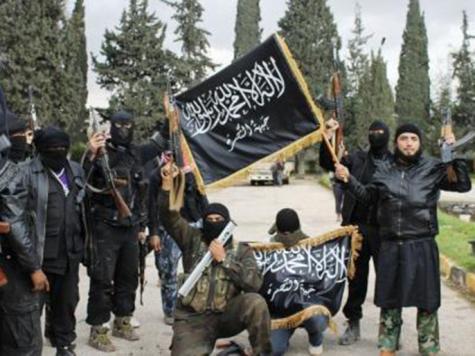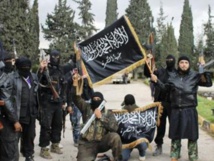Seven rebels died defending the base, which Al-Nusra failed to capture, according to the Syrian Observatory for Human Rights.
In a statement on Facebook, Division 30 said five of its members had been killed and 18 wounded in the fight for the base.
It called on rebels to come to its aid in defending the base, and demanded that Al-Nusra stop "spilling the blood of Muslims."
Al-Nusra accused Washington of recruiting "forces from what it calls 'the moderate opposition'... to undergo a training and rehabilitation programme run by the Central Intelligence Agency.
"A few days ago, one of these groups called Division 30 entered Syria... so Al-Nusra arrested several soldiers of this division," the group announced.
It did not specify how many rebels had been captured, or where or when the incident took place.
The Observatory had reported that Al-Nusra captured eight rebels from Division 30 in a village in the northern province of Aleppo late Wednesday.
Combined with the seven rebels killed on Friday, this would mean at least 13 of the 54 original Division 30 members who entered Syria in mid-July have been neutralised.
On Thursday, a US defence department spokeswoman denied the rebels' reported capture.
Al-Nusra accused Division 30 of being "agents of American interests and projects in the area, to fight the 'terrorist organisations,' as they (the US and its rebel allies) described it."
The jihadist group said Division 30 had coordinated with aircraft from the US-led coalition attacking jihadists in Syria to strike Al-Nusra positions.
"We warn the soldiers of this division not to proceed with the American plan... Their return to the truth and the right way will be more beneficial," the statement said.
Al-Nusra has previously attacked US-backed groups in northern Syria, including the Syrian Revolutionaries Front and the Hazm Movement, leading to the dissolution of both factions.
Charles Lister, a visiting fellow at the Brookings Doha Centre think-tank, said the capture of its fighters could deal "a mortal blow" to the reputation of the US's train-and-equip programme in Syria.
"The simple reality here is that any explicitly US-trained rebels effectively have a target set on their backs," he said.
- IS bridges destroyed -
Syria's conflict began in March 2011 with anti-government protests, but has devolved into a multi-front civil war among rebels, regime forces, Kurdish fighters and jihadist groups.
The war, in which various fighting groups have carved out what are fluid areas of control, has killed at least 230,000 people.
Al-Nusra's jihadist rival, the Islamic State group, has seized territory in Syria's north and centre, as well as along the country's border with Iraq.
Since July 2014, IS has used the border town of Albu Kamal in the eastern Deir Ezzor province to link the Syrian and Iraqi parts of its so-called "caliphate."
On Friday, the US-led coalition destroyed two bridges linking Albu Kamal to the Iraqi border, which the Observatory called "strategically important for IS's movements".
The two bridges leading out of Albu Kamal -- one to the east, and one to the southeast -- were IS's "main routes to the Iraqi border," Observatory head Rami Abdel Rahman said.
"Using these bridges, it would take IS only a few minutes to reach the Iraqi border from Albu Kamal," Abdel Rahman said.
"The strikes do not cut off IS's route to Iraq, but they make IS movements there more difficult, because it will take them longer and they will be in view (of the coalition) for a longer period of time," he added.
The Pentagon confirmed strikes in the area, and a senior US officer said they will have a "profound impact" on IS abilities to carry out operations in the neighbouring and strategically important Iraqi province of Anbar.
------------------------------------------------------------------------------------------------------------
In a statement on Facebook, Division 30 said five of its members had been killed and 18 wounded in the fight for the base.
It called on rebels to come to its aid in defending the base, and demanded that Al-Nusra stop "spilling the blood of Muslims."
Al-Nusra accused Washington of recruiting "forces from what it calls 'the moderate opposition'... to undergo a training and rehabilitation programme run by the Central Intelligence Agency.
"A few days ago, one of these groups called Division 30 entered Syria... so Al-Nusra arrested several soldiers of this division," the group announced.
It did not specify how many rebels had been captured, or where or when the incident took place.
The Observatory had reported that Al-Nusra captured eight rebels from Division 30 in a village in the northern province of Aleppo late Wednesday.
Combined with the seven rebels killed on Friday, this would mean at least 13 of the 54 original Division 30 members who entered Syria in mid-July have been neutralised.
On Thursday, a US defence department spokeswoman denied the rebels' reported capture.
Al-Nusra accused Division 30 of being "agents of American interests and projects in the area, to fight the 'terrorist organisations,' as they (the US and its rebel allies) described it."
The jihadist group said Division 30 had coordinated with aircraft from the US-led coalition attacking jihadists in Syria to strike Al-Nusra positions.
"We warn the soldiers of this division not to proceed with the American plan... Their return to the truth and the right way will be more beneficial," the statement said.
Al-Nusra has previously attacked US-backed groups in northern Syria, including the Syrian Revolutionaries Front and the Hazm Movement, leading to the dissolution of both factions.
Charles Lister, a visiting fellow at the Brookings Doha Centre think-tank, said the capture of its fighters could deal "a mortal blow" to the reputation of the US's train-and-equip programme in Syria.
"The simple reality here is that any explicitly US-trained rebels effectively have a target set on their backs," he said.
- IS bridges destroyed -
Syria's conflict began in March 2011 with anti-government protests, but has devolved into a multi-front civil war among rebels, regime forces, Kurdish fighters and jihadist groups.
The war, in which various fighting groups have carved out what are fluid areas of control, has killed at least 230,000 people.
Al-Nusra's jihadist rival, the Islamic State group, has seized territory in Syria's north and centre, as well as along the country's border with Iraq.
Since July 2014, IS has used the border town of Albu Kamal in the eastern Deir Ezzor province to link the Syrian and Iraqi parts of its so-called "caliphate."
On Friday, the US-led coalition destroyed two bridges linking Albu Kamal to the Iraqi border, which the Observatory called "strategically important for IS's movements".
The two bridges leading out of Albu Kamal -- one to the east, and one to the southeast -- were IS's "main routes to the Iraqi border," Observatory head Rami Abdel Rahman said.
"Using these bridges, it would take IS only a few minutes to reach the Iraqi border from Albu Kamal," Abdel Rahman said.
"The strikes do not cut off IS's route to Iraq, but they make IS movements there more difficult, because it will take them longer and they will be in view (of the coalition) for a longer period of time," he added.
The Pentagon confirmed strikes in the area, and a senior US officer said they will have a "profound impact" on IS abilities to carry out operations in the neighbouring and strategically important Iraqi province of Anbar.
------------------------------------------------------------------------------------------------------------









 Home
Home Politics
Politics











